Key takeaways:
- Songwriting awards offer recognition, connections, and validation, influencing career trajectories and boosting confidence.
- Understanding award requirements, including originality, genre criteria, and submission timing, is crucial for success.
- Common mistakes include submitting non-representative tracks, neglecting to tailor submissions, and underestimating the importance of artist bios.
- Feedback from peers and networking with past winners can significantly enhance creative development and submission strategies.
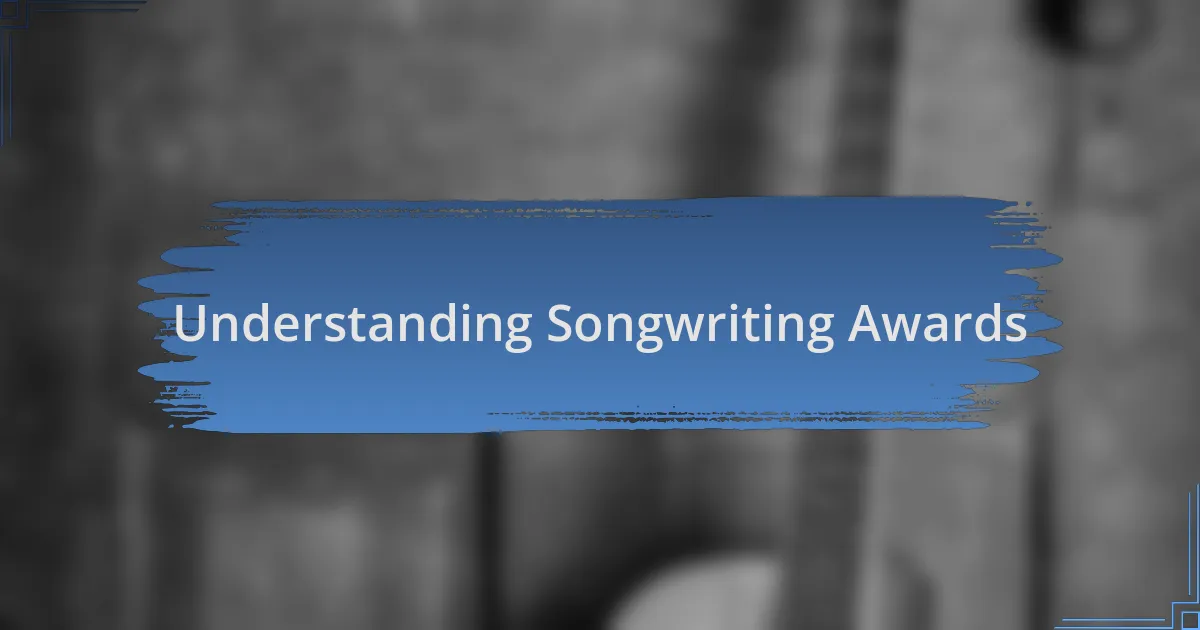
Understanding Songwriting Awards
When I first delved into songwriting awards, I was naïve about their importance. The thrill of recognition can be a powerful motivator, but I soon learned that these awards are also about connections and credibility. Have you ever wondered how winning an award could open doors?
As I attended various ceremonies, I realized that the atmosphere was electric—filled with creatives who share a passion for music. I remember standing in awe as a seasoned songwriter spoke about their journey. It struck me that these awards celebrate not just talent, but the perseverance and hard work behind each song. Isn’t it inspiring to think that each nomination tells a story of dedication?
Understanding the criteria for these awards was another revelation for me. I initially thought creativity was the only factor that mattered, but things like songwriting structure, originality, and emotional impact play significant roles too. Reflecting on this, I often think about how much I could have improved my craft if I had sought out this knowledge sooner. Have you considered how understanding these nuances could elevate your songwriting?
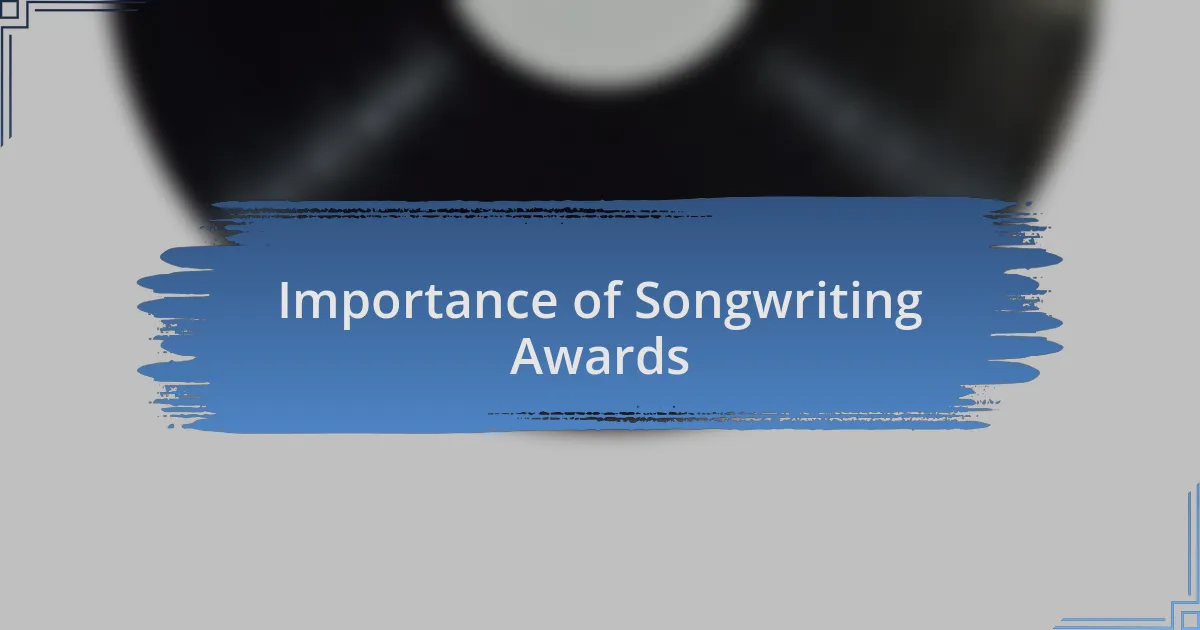
Importance of Songwriting Awards
Songwriting awards serve as a validation of your artistic journey, offering recognition that can boost your confidence in ways you might not expect. I remember submitting my first song and feeling an overwhelming mix of pride and anxiety. When I received feedback, it wasn’t just about the accolades; it was a moment of self-discovery, revealing strengths and areas for growth that I hadn’t noticed before. How often do we overlook the power of external validation in our creative processes?
Moreover, winning or even being nominated for a songwriting award can significantly impact your career trajectory. I once watched as a fellow songwriter, after receiving a local award, was approached by a record label representative. It was a turning point that reminded me how critical exposure can be in an industry filled with talent. What if those awards could be the catalyst that propels you into your next big opportunity?
Lastly, these awards foster a sense of community among songwriters. Attending a ceremony is like reuniting with old friends—even if you’ve just met. I felt an immediate connection with others who shared my passion and dreams. Isn’t it incredible how being surrounded by like-minded individuals can reignite your creative flame and inspire collaboration?
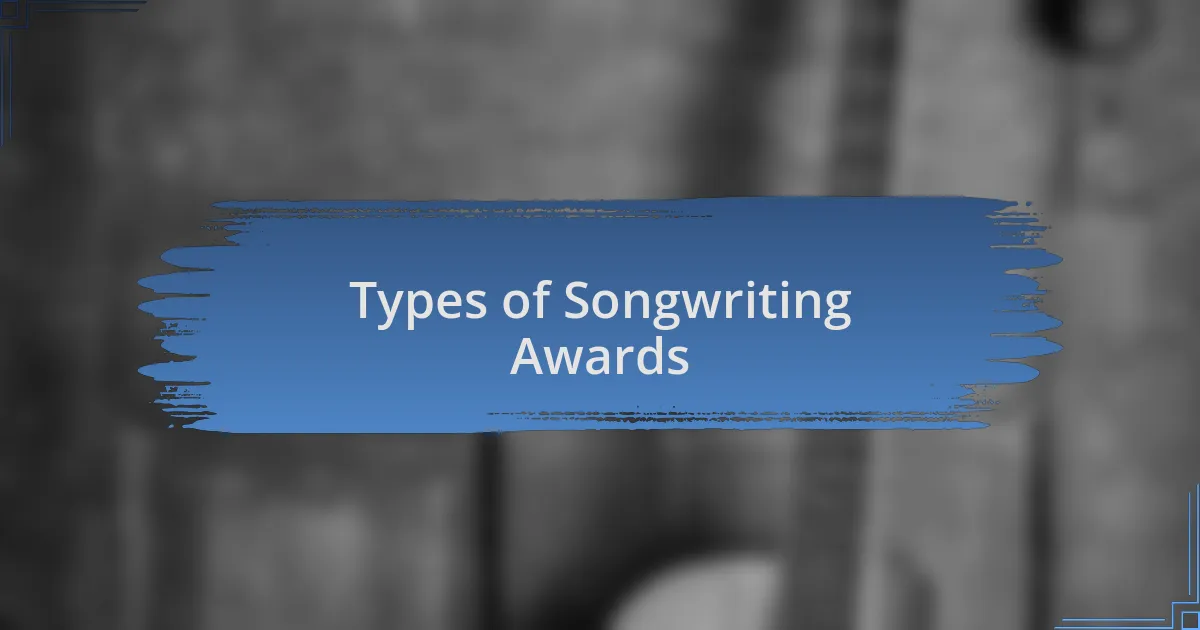
Types of Songwriting Awards
Songwriting awards come in various forms, each catering to different genres and objectives. For instance, I remember when I first stumbled upon genre-specific awards, like those focusing exclusively on country or rock music. It opened my eyes to the fact that there are platforms celebrating every musical niche, which made me feel more connected to my own style as a songwriter. Have you ever felt that moment of belonging when you discover an award that genuinely resonates with your artistic voice?
Another notable type is the peer-reviewed awards, where fellow songwriters assess each other’s work. Participating in a contest like this felt like being in a creative dialogue, where my songs were not just judged but appreciated by those who understood the craft. Reflecting on my experience, I realized how valuable feedback from peers could shape my songwriting in profound ways. Isn’t it fascinating how the right feedback can lead to unexpected breakthroughs?
Additionally, there are audience-driven awards, where fan votes determine the winners. I distinctly recall the excitement of rallying support from friends and fans, turning my songwriting journey into a community event. When I saw my supporters engage, it felt less like a competition and more like a celebration of shared passion. Could those moments of collective joy be the true essence of what songwriting awards are all about?
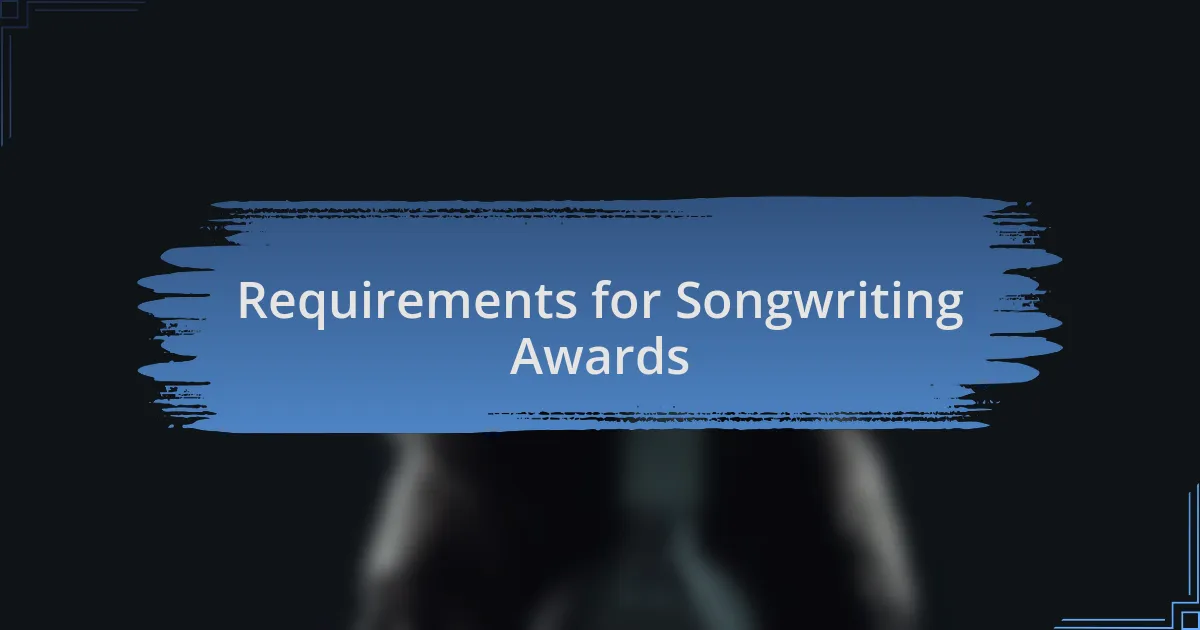
Requirements for Songwriting Awards
Understanding the requirements for songwriting awards is crucial if you want to put your best foot forward. Typically, judges look for originality in your lyrics and composition. I recall the first time I submitted a song; I was surprised at how much emphasis was placed on a unique perspective. Have you ever had a moment where you thought your story was too personal? For awards, that authenticity is often what makes a piece stand out.
In addition to originality, many awards have specific genre categorizations. It’s essential to tailor your submissions to match those criteria. I once submitted a song that I thought was genre-blending, only to realize too late that it didn’t fit within the award’s defined parameters. Have you ever felt a piece of yours straddling the line between genres? It can be a fine balance, and knowing the rules can save you from unnecessary disappointment.
Lastly, timing can be everything. Almost all awards have strict deadlines for submissions, and missing those can mean losing a valuable opportunity. I remember rushing to finalize my entry just before a deadline, and the adrenaline rush was both exhilarating and stressful. Have you experienced that last-minute push to get your creative work in? It’s a ride, but keeping a calendar and setting early personal deadlines can really help ease that pressure.
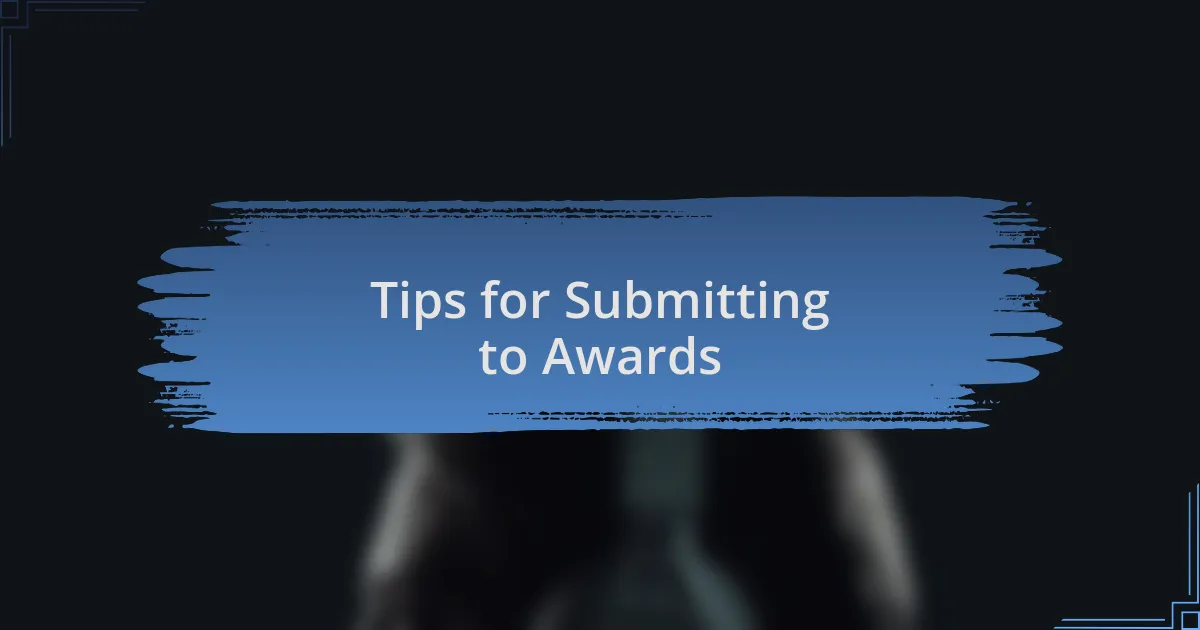
Tips for Submitting to Awards
When submitting to songwriting awards, it’s crucial to thoroughly read the submission guidelines. I once overlooked key requirements for a prestigious competition, and my submission got disqualified. Has that ever happened to you—putting your heart into a piece only for it to be rejected due to a simple oversight? I learned that even the smallest details deserve attention, and that diligence can really pay off.
Another important tip is to ensure your work is professionally mixed and mastered before submission. I recall a time when I thought my raw demo captured my song’s essence perfectly, but the feedback highlighted its rough edges. Have you ever shared an unfinished piece and felt the sting of criticism? A polished production elevates your song and shows judges that you’ve put in the effort, making a substantial difference in how your work is perceived.
Networking with past winners can also provide invaluable insights. I reached out to a former award recipient, who shared their strategies and what worked for them. It made me realize the power of connection. Have you tapped into your community for advice? Those conversations can offer not just tips, but also encouragement that keeps you inspired during the submission process.

Common Mistakes to Avoid
Many songwriters unknowingly fall into the trap of submitting multiple songs that aren’t fully representative of their style. In my early days, I sent a collection of tracks that I thought showcased versatility, but instead, it confused judges. Have you ever crammed different vibes into one submission, only to realize it left people scratching their heads? Focus on a few standout pieces—those that genuinely reflect who you are as an artist.
Another common misstep is neglecting to tailor your submission to the specific award you’re entering. I once sent a heartfelt ballad to a contest that favored upbeat tracks. The disheartening feedback emphasized that my song didn’t fit the theme. Have you ever felt like your masterpiece didn’t quite resonate with what the judges were looking for? It’s essential to think strategically and align your submissions with the values and preferences of the competition.
Finally, many aspiring songwriters tend to overlook the significance of their artist bio and cover letter. When I first started, I thought these aspects were mere formalities. However, I learned that a compelling story behind your music can captivate judges. Have you really considered how your journey shapes your songwriting? Crafting a narrative that connects with the essence of your song can make a lasting impression and elevate your submission from a simple tune to a heartfelt story.